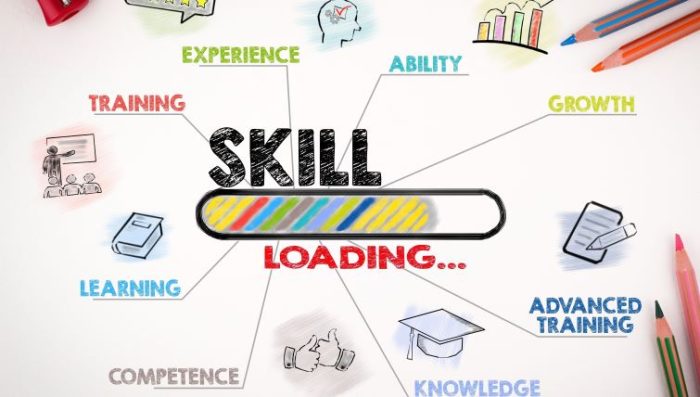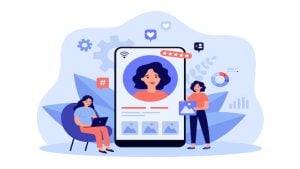How to Sharpen Essential Career Skills for Success in 2024
 Publié le 12 February 2024
Publié le 12 February 2024
Be prepared to stand out in the job market and grow in your role by knowing how to sharpen essential career skills for success in 2024.
Do you feel stuck in your present job and that your career is going nowhere fast? Or do you have the ‘new year, new me’ optimism? There comes a point in everyone’s working life when they look forward and ask themselves where they will be in 5 or 10 years. They examine their career to date and look at what the next step might be, what career skills they already possess, and how they can develop existing ones or acquire new ones.
It’s never too late to undertake learning that leads to new career skills. And with the rapid advances in technology in recent years, there can be times when those new skills are a necessity rather than a choice. If you’ve marked out this year as being one where you will focus on your career skills, what ones should you be looking at?
Globalization and career skills
Image sourced from Pew Research
There’s no arguing that the world now seems like a smaller place. Many businesses look to global marketplaces to fuel growth and expansion. This is one of the factors that has fueled the growth of remote and hybrid working, with some 41% of US workers choosing to work a hybrid schedule with some days working from home and others in the office.
The impact of globalization on career skills can vary greatly according to sector. The need for customer support across multiple time zones means that businesses need to be able to have staff willing to work different shifts or to have workers in different regions, which often necessitates a well-defined remote policy. It’s not just about time zones; staff now need to have some idea of cultural differences and in some cases, be able to speak local languages.
There is also the logistics issue to consider. If you’re going to supply to customers around the world then you need to ask questions such as what is supply chain optimization going to do to help my business? If you are going to target that global marketplace, then you have to be able to identify the different career skills you need in your employees.
Technology’s role
Image sourced from Precedence Research
As well as globalization, another factor that has changed some of the career skills needed in the modern workplace, is technology. If you’ve been working for the last couple of decades, you will have seen some rapid advancements in tech and the role it plays in many jobs. You have AI-powered systems and automation which can improve productivity and reduce human error.
Even the types of phone services available to businesses have changed. Different systems such as VoIP mean that remote teams find it easier to stay in touch and call centers have also adopted many different employee communication tools and applications.
Where needed, businesses train their staff on these new systems, thus enhancing their existing career skills. One valuable resource is a knowledge base, frequently accessed for quick reference and information retrieval.
Technology may be the biggest factor when it comes to changes in the job market and the need for workers to learn new skills or to develop those they already have. This is a trend that will continue for years to come; as new technology is introduced, businesses will need their existing workers to retrain or they will look to new hires with the skills they need.
Even within the field of technology, there is a leading light changing the way we work and the skills and knowledge needed. With AI, the sky may really be the limit. Being able to work with and use AI-powered systems may become one of the primary skills needed in future workplaces. It’s also one of the skills that could bring you a dramatic increase in your gross salary.
What career skills should you be looking at?
If this is your year for change and growth, then you should be looking at your current resume and considering how to enhance the skills you have, or what new skills you can learn and how you can learn them. Of course, those skills will vary from sector to sector but this list covers most of the important career skills.
- Digital literacy
Image sourced from Atlanta Fed
Digital literacy can encompass many different skills that may be needed in your job role. It can cover everything from in-depth cybersecurity knowledge to being able to use data drift detection tools. In some roles, digital literacy is essential to do your job but also to look at career progression.
While it’s worth noting that the level of digital literacy may vary, an analysis found that around 92% of jobs require some sort of digital literacy. What are the main digital career skills you should be thinking about?
- Proficiency in using data. Data plays a major role in modern business, especially when it comes to ecommerce organizations. This can be very role-dependent and can range from data analytics and visualization to data engineering skills.
- Cybersecurity. With cybercrime constantly on the rise, the need for cybersecurity skills has never been greater. Companies need people who can protect their data and who have skills in combating threats such as phishing and hacking attacks,
- Tech knowledge. With the growth of AI and ML (machine learning), being able to design and/or work with these systems can make a great addition to your resume. Many employers now want their workers to have some competence with AI.
Within the area of digital marketing, expertise as a lead generation specialist can also significantly enhance your career prospects. This skillset, along with proficiency in using data, cybersecurity, and tech knowledge, plays a major role in modern business strategies and can open doors to exciting opportunities.
- Communication skills
With the world getting smaller, it needs more communication skills. This can include being able to use (or even build) communication tools and platforms or being able to connect with customers using written, verbal, or visual communication. You can also think of being able to speak more than one language as a valuable career skill.
There are various areas where you can look to develop or enhance communication skills.
- Visual storytelling. This can cover everything from using video-making and editing skills to make marketing videos for social media to using various design programs to make infographics or other visual material.
- Platforms. With many businesses taking an omnichannel approach these days, marketers need to be able to work on various platforms. Developing career skills that allow you to switch from a tweet on X/Twitter to regular posts on Facebook can be an important step.
- Clarity. It’s important to be able to get your message across, often in a way that restricts what you do. Being able to communicate concisely and clearly is one of the most important soft skills employers look for.
- Active listening. Good customer support is something many people expect now. As much of this support is provided by call centers (or virtual call centers) or dedicated teams, you must have staff who are patient and who can listen to and understand what callers want or need.
- Emotional intelligence
Image sourced from Zipdo
This is one of the career skills that is needed at every level of your organization, ranging from a data engineer implementing what’s in a delta book to the highest echelons of management. It’s all about recognizing emotions, both your own and those expressed by others, and can include other soft skills such as empathy and awareness.
Emotional intelligence can be important in your managers. It can help them to inspire and motivate their teams, even when there are challenging circumstances. It also means that they can communicate effectively with those they are managing. Emotional intelligence is also important when it comes to conflict resolution, something that may be needed at every level of your business.
When you have employees with high emotional intelligence, it can help encourage collaboration and make teamwork more productive and efficient. If combined with good communication skills, you are likely to have a great working environment. Relationships between workers will probably be stronger and can help your workforce thrive, even in the face of adversity.
- Innovation
Innovation is just not about new systems and tools. It’s also about creative thinking or the ability to think outside the box. If you’re faced with a problem during your appointed tasks, do you seek help or do you try to find a solution yourself? The problems – and any associated innovation – may be a technical issue or could be in another area such as call center agent scheduling.
Having a creative mind also means that you can be more adaptable to the use of new tech or tools. You can see the benefits and look at ways you can adopt new ways of doing things to improve your (or your team’s) productivity and efficiency. That adaptability might even include ways of using the tech or tools in different ways that benefit your business.
While you may see it as one of the lesser career skills, it is something that is more relevant to the modern workplace. Organizations want individuals who have that creative thinking ability and who can quickly adapt both to problems and to new tools and systems. The other thing to consider is that people with these skills are often those who are earmarked for management roles or career progression.
The takeaway
Free to use image sourced from Pixabay
While this is not an exhaustive list, it does represent the main career skills to think about. Of course, the other thing to think about is how you learn. In many cases, employers will offer on-the-job training as they want to encourage both career progression and employee retention. They might offer that training in the form of in-person vocational learning or as online courses and webinars.
People often decide to develop their career skills by themselves. Although this may incur costs, it can be a good choice when people plan to leave their current role or if their employer offers limited learning opportunities. Whatever path you choose to take, 2024 could be the ideal year to enhance your current career skills or to learn new ones.







